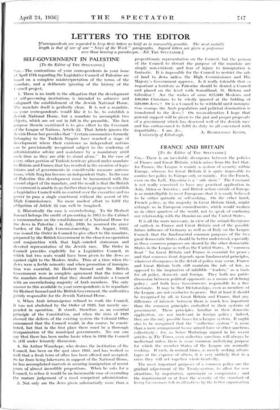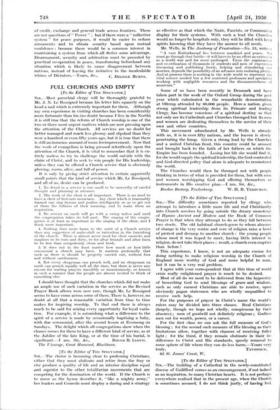FRANCE AND BRITAIN
[To the Editor of THE SPECTATOR.]
in,—There is an inevitable divergence between the policies of France and Great Britain, which arises from the fact that, for France, the League is mainly a system of security within Europe, whereas fill. Great Britain it is quite impossible to confine her policy to Europe only or mainly. For the French, even on the Left. Abyssinia is a " side show." The Covenant, is not really conceived to have any practical application hi Asia, Africa or America ; and British action outside of Europe is so unintelligible to most Europeans that it is easily believed to be either quixotic or self-seeking. On the other hand, French policy, as the majority in Great Britain think, might entangle us in European commitments, which would weaken us in other quarters of the world, not to speak of confusing our relationship with the Dominions and the United States.
It is all the more necessary, in view of the actual divergence of outlook in France and Great Britain and of the possible future influence of Germany as well as of Italy on the League Council, that the fundamental common purposes of the two great democratic States should be better understood, especially as those eon iiiiii n purposes are shared by the other democratic States in the League as well as the United States. A " common front " for Great Britain and France is essential for peace ; and that continua front depends upon fundamental principles, whate%er divergences in the detail of policy may occur. France and Great Britain both still maintain the rule of law, as opposed to the inspiration of infallible " leaders," as a basis for all policy, domestic and foreign. They both use public discussion between political opponents as a means of defining policy ; and both have Governments responsible to a free electorate. It may be that Dictatorships, even as members of the League. arc not conducive to peace. But at least it should be recognised by all, in Great Britain and France, that any difference of interests between them is much less important than the common principles embodied in their systems of government. These principles, familiar in their domestic application, are not irrelevant in foreign policy ; indeed, they are the only possible bases for a League system. It ought also to be recognised that the " collective system " is more than a mere arrangement to use armed force or other sanctions collectively ; for. as Sefior Madariaga argued in his recent articles in The Times, even collective sanctions will always be ineffectual unless there is so:ne common underlying purpose for which the member States of the League are normally working. If each, in normal times, is merely seeking advan- tages at the expense of others, it is very unlikely that in a crisis they will net together whole-hearteilly.
The nmst important purposes of a common policy are the gradual adjustment of the Treaty-system, to allow for new situations, by negotiation, agreement or compromise ; and the improvement or at least the security of the standard Of living for common folk in all nations by the better organ isat ion
of credit, exchange and general trade across frontiers. These are not questions of" Power " ; but if there were a" collective system" for peace purposes, it would be easier to reduce armaments and to obtain security based upon mutual confidence ; because there would be a common interest in maintaining a system from which all derive some advantage. Disarmament, security and arbitration must be preceded by practical co-operation in peace, transforming beforehand any situation which is likely to cause disagreement between nations, instead of leaving the initiative to the incalculable
whims of Dictators.—Yours, &c., C. DELISLE BURNS.



















































 Previous page
Previous page